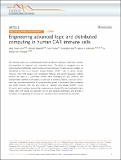Engineering advanced logic and distributed computing in human CAR immune cells
Author(s)
Cho, Jang Hwan; Okuma, Atsushi; Sofjan, Katri; Lee, Seunghee; Collins, James J.; Wong, Wilson W; ... Show more Show less
DownloadPublished version (2.183Mb)
Publisher with Creative Commons License
Publisher with Creative Commons License
Creative Commons Attribution
Terms of use
Metadata
Show full item recordAbstract
© 2021, The Author(s). The immune system is a sophisticated network of different cell types performing complex biocomputation at single-cell and consortium levels. The ability to reprogram such an interconnected multicellular system holds enormous promise in treating various diseases, as exemplified by the use of chimeric antigen receptor (CAR) T cells as cancer therapy. However, most CAR designs lack computation features and cannot reprogram multiple immune cell types in a coordinated manner. Here, leveraging our split, universal, and programmable (SUPRA) CAR system, we develop an inhibitory feature, achieving a three-input logic, and demonstrate that this programmable system is functional in diverse adaptive and innate immune cells. We also create an inducible multi-cellular NIMPLY circuit, kill switch, and a synthetic intercellular communication channel. Our work highlights that a simple split CAR design can generate diverse and complex phenotypes and provide a foundation for engineering an immune cell consortium with user-defined functionalities.
Date issued
2021Department
Massachusetts Institute of Technology. Synthetic Biology Center; Massachusetts Institute of Technology. Institute for Medical Engineering & Science; Massachusetts Institute of Technology. Department of Biological Engineering; Harvard University--MIT Division of Health Sciences and TechnologyJournal
Nature Communications
Publisher
Springer Science and Business Media LLC